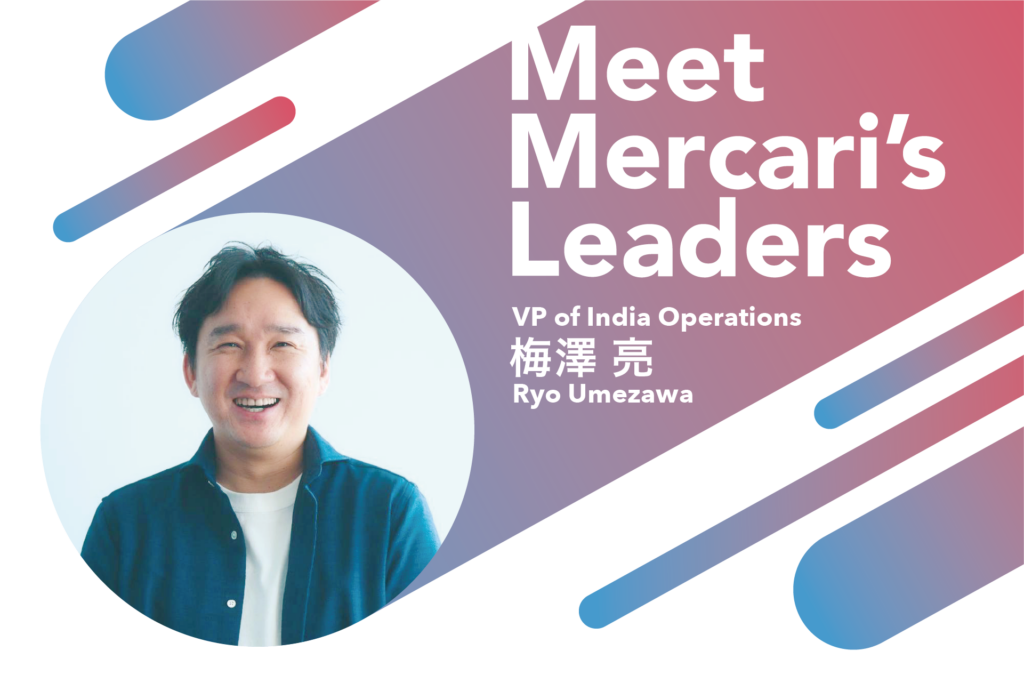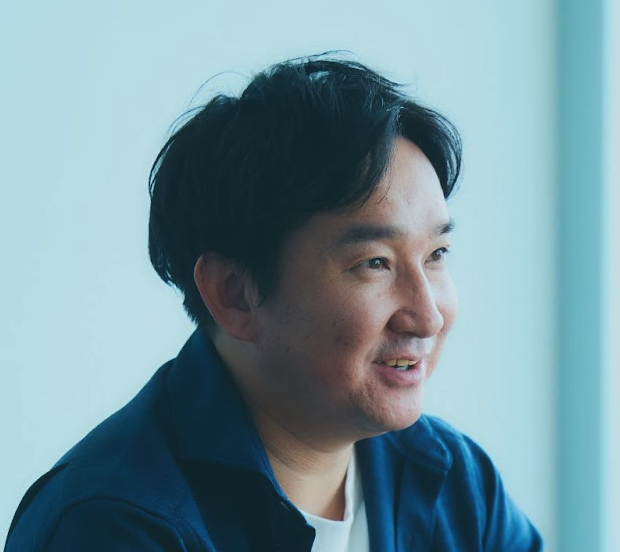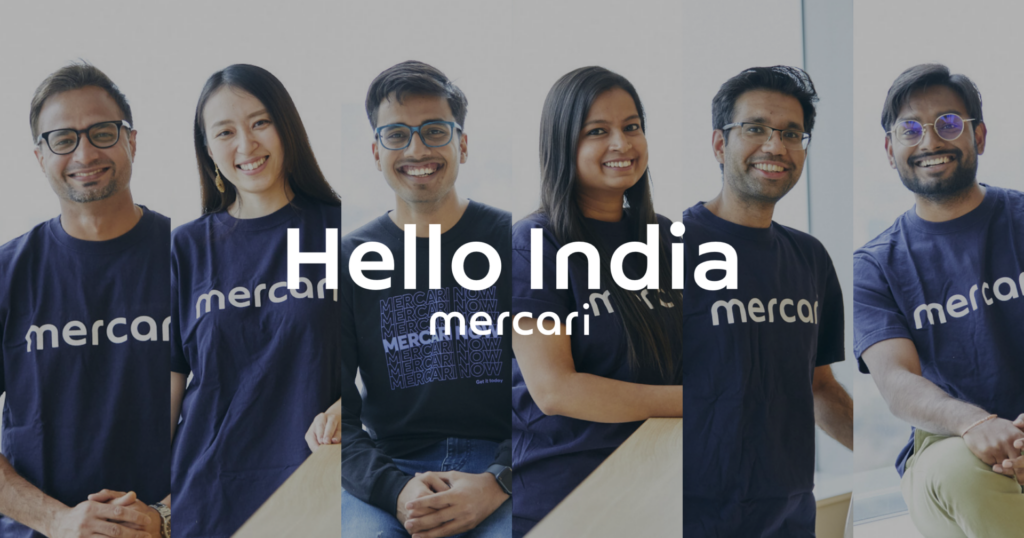
As head of HR, Ryo Umezawa (@ume) has led various efforts at Mercari Group, from the establishment of Merpay’s HR organization to the cultivation of company culture.
Believing that comfort inhibits growth, Ryo took on the new position of VP at Mercari India, Mercari’s development center located in Bangalore, in April 2025. He tells us that his decision to take on this bold challenge was greatly inspired by the mission and values emblematic of the Mercari spirit. As a leader of Mercari’s HR organization—which has long supported the business through various transformations, from IPO to global expansion—Ryo shared his insights about the throughline that defines Mercari’s identity, as well as the perspectives crucial to HR.
Profile
-

Ryo Umezawa
Vice President of India Operations. Ryo joined Mercari in March 2018. He has been involved in the establishment of Mercari Group policies and the launch of new businesses such as Merpay and Mercoin. Later, he assumed the role of Vice President of HR (Japan Region) where he was in charge of not only HR but general affairs, organizational culture, executive meetings, and more across the Japan business. He was assigned to Bangalore, India, in April 2025.
Mercari India and its “Back to Startup” mentality
—Since joining Mercari in 2018, you’ve taken on a broad range of responsibilities, from the establishment of Merpay’s HR organization to office management, general affairs, and the cultivation of company culture. I heard your role changed significantly this April. Could you start by telling us about your current responsibilities?
I am currently in charge of overall operations at Mercari India, including corporate HR. With operations gearing up now, I’ve officially moved to India as of this April.
Our development center in India was established around three years ago and continues to hire and grow today. The plan right now is to enhance our development structure centered around AI technologies, and my role is to drive this transformation not only on the corporate and HR sides but throughout the organization as a whole.
—Why did you decide that now was the time to move to Mercari India?
There are several reasons. The first is that Mercari India is still a young organization and has many areas yet to be established, including various processes and governance systems. Another is that Mercari India’s engineering capabilities and scalability are key to Mercari’s future global competitiveness. Although the organization is still relatively small now, I believe Mercari India will eventually lead Mercari’s technological advancement.
One personal reason is that, after being at Mercari for a long time, I felt that I needed to step out of my comfort zone in order to achieve further growth. That’s why I chose to take on the challenge of relocating to a new environment in India. I also believe that by demonstrating as VP that global career paths exist within Mercari, I can potentially help broaden career opportunities for all members.
—You mentioned that Mercari India is essential to Mercari’s future growth. What do you see as the strengths of Mercari India?
Primarily, the talent. India has an unmatched depth of skilled tech professionals. Plus, India as a nation has an energy and mindset that is closely aligned with Mercari’s “Back to Startup” philosophy. Having advocates for taking on bold challenges not only from our Japan headquarters but from our overseas offices as well will be a huge strength moving forward.
The apparel industry taught me the importance of consistent effort
—I want to go back in time a bit. How did you initially join Mercari?
I’ve been at Mercari for over seven years now, and I have consistently worked in the HR domain. I first joined Mercari about half a year before it went public. At the time, Mercari was working on the launch of Merpay and Souzoh, and was also working hard on development for Mercari US.
Initially, the talent acquisition team was a small but strong team of just a few members, but there was also a pressing need to strengthen the company’s foundations in areas like evaluation policies and organizational structures. Mercari was already a unicorn at the time, so I honestly wondered if there would be any challenges left for me to tackle. However, through the interviews, I discovered many areas that still needed work and felt that ample opportunities awaited me there.
I was also incredibly inspired by the passion of Mercari’s leaders, from CEO Shintaro to Fumiaki, and the strength of their genuine desire to change the world. I could tell that they were for real. I think their sincerity is what pushed me to join without hesitation.
—Was your first job in a similar industry to Mercari?
No, it was actually in the apparel industry.
—Oh, that’s surprising!
Yes. After graduating, I joined a startup specializing in staffing and store operations for the apparel industry. Because it was a startup, I had to wear many hats, from managing stores to handling corporate functions, HR, finance, and business planning—whatever it took to help the company grow! (laughs)
As the organization grew and the roles were becoming more distinct between the headquarters and stores, we received an acquisition offer, and I handled the post-merger integration processes. Later, I moved to GLADD, an e-commerce company specializing in flash sales. Mercari is my third company.
—Do you have memorable experiences from your early days as a store manager?
The experience of working at department stores was the epitome of a B2C business model—this was the world of customer sales, and the job required consistent effort in order to generate repeat sales.
The apparel industry itself is a tough space, but selling other companies’ brands especially requires exceptional customer service skills and the ability to generate revenue. There is a constant pressure to deliver results.
—How did you acquire such customer service skills?
My family operates a traditional Japanese inn, and I helped out there from a young age. Since elementary school, I handled tasks like handing out keys at the front desk, delivering ice to guests’ rooms, and making beds. I guess customer service was already second nature to me. (laughs)
—10 years ago, joining a startup straight out of school was unconventional. Did you always have a strong entrepreneurial spirit?
That’s true. Yes, perhaps I was influenced by my family’s business, but I did always have a vague desire to start a business. But it wasn’t because I had a specific vision in mind; I just had an admiration for the work of social entrepreneurs whose priority is contributing to society.
In university, I majored in environmental studies and was interested in areas like sustainability and environmental management. I had aspirations to become an entrepreneur with a business that would be both profitable and contribute positively to society.
—And with those aspirations, you joined a startup. Did things turn out to be different from what you imagined?
Indeed. As I started working, my priorities shifted. As soon as I joined, I was given a management role and was responsible for the company’s immediate business survival, which became a more pressing matter than my initial social ideals. (laughs) But I was surrounded by colleagues who loved apparel, and also frequently interacted with our CEO and leadership, and I enjoyed my job.
Of course, my desire to contribute to society persisted, and remains strong to this day. That’s also why I resonated strongly with Mercari’s mission, values, and initiatives toward sustainability.
I began to think that a company like Mercari, with both the influence and the sincere desire to contribute positively toward society, could generate greater social impact than a non-profit organization or social entrepreneur. Perhaps solving social issues through a business could, in the end, be more effective.
Mercari’s strength is its soul
—HR is a particularly challenging area when it comes to running a business. What makes it challenging, and also what makes it interesting?
Starting with the latter, HR is an intriguing field because the talent and solutions required change significantly depending on the phase the company is in. In the startup phase, it’s all about recruiting exceptional talent. As the company grows and goes public, employee development and retention become central, requiring well-designed evaluation and organizational systems. And as the organization expands even further, a different set of challenges arise.
The constant need to adapt to change is what makes HR both challenging and interesting. If the HR department doesn’t function properly, the growth of the entire company comes to a halt. That’s why, while constantly adapting to change, HR must also not only maintain but strengthen the fundamental values and culture core to the company’s unique identity.
—The Mercari Culture Doc, which outlines a set of shared values held by employees at Mercari, is central to our HR systems and daily communication at the workplace. Why is this Culture Doc so deeply ingrained at Mercari?
This is just my personal take, but I think that at any company it’s easy to simply create systems and values. The hard part is giving them a “soul.” In other words, to have them become a culture that is embodied in the actions of employees every day. This is incredibly challenging and takes immense work and perseverance.
Before I joined the company, Mercari’s executive team invested immense time and energy into formulating the company’s mission and values. Their commitment sits at the base of the company’s culture. On top of that, daily efforts to prevent the values from becoming just a set of words are also instrumental to creating an ingrained culture.
For instance, we include a slide with the company values in all company-wide presentations and list the company mission and foundations in meeting agenda templates. We also set up a system to recognize employees who embody the values. We do everything we can to increase opportunities for employees to come in contact with and think about our mission and values in their daily work.
Above all, I think it’s essential for leaders to act as role models by embodying our four values and talking about them in their own words. That’s what I think it means to give systems and values a “soul.”
And I believe that when our mission and values are a natural part of life at Mercari, the culture itself will serve as onboarding for new members who resonate with it, regardless of nationality.
Taking on bold challenges is important in HR
—What are the guiding principles that you live by while working in HR?
This may sound cliché, but I believe in always maintaining a positive mindset and enjoying your work. Also, not limiting yourself to your role and field. I don’t like to think things like, “I’ve done my job as HR and that’s outside of my scope of responsibility,” or “business and sales have nothing to do with me.” I think it’s important to consider how you can contribute to the company as a whole and proactively be involved and committed in all different areas.
—What do you think is important when working as part of a team?
Establishing psychological safety and fostering an environment where everyone can openly share constructive opinions. It’s important not to simply keep the peace but to deliberately provoke constructive discussions. I think a “Go Bold” attitude toward continuously taking on new challenges is important in all situations.
Bonus: How I use Mercari!
I love playing golf, and I like to buy my golf clubs off Mercari. I usually pick around 3 clubs that I’m interested in, test them out on the golf course or range, and then sell the ones that didn’t quite fit me. There is a slight discount, but the thing I’m happiest about is being able to test out all the latest clubs. It’s also incredibly difficult to find cardboard boxes for golf clubs, so it’s great that I can ship them using the same box that they arrived in.
Photographer: Tomohiro Takeshita / Original Article: Yuta Ishikawa / English Translation: Mercari Global Operations Team
Related job positions
Here are some of our open positions!
-
Credit Ops Manager / 与信事業オペレーションマネージャー – Merpay
Office: 東京・六本木オフィス
Company/Business: メルペイ
-
CISO(Chief Information Security Officer) – Merpay / Mercoin
Office: 東京・六本木オフィス
Company/Business: メルペイ
-
COO (Chief Operating Officer) – Merpay / Mercoin
Office: 東京・六本木オフィス
Company/Business: メルペイ
Direct you to a careers site
Related job positions
Here are some of our open positions!
Direct you to a careers site









